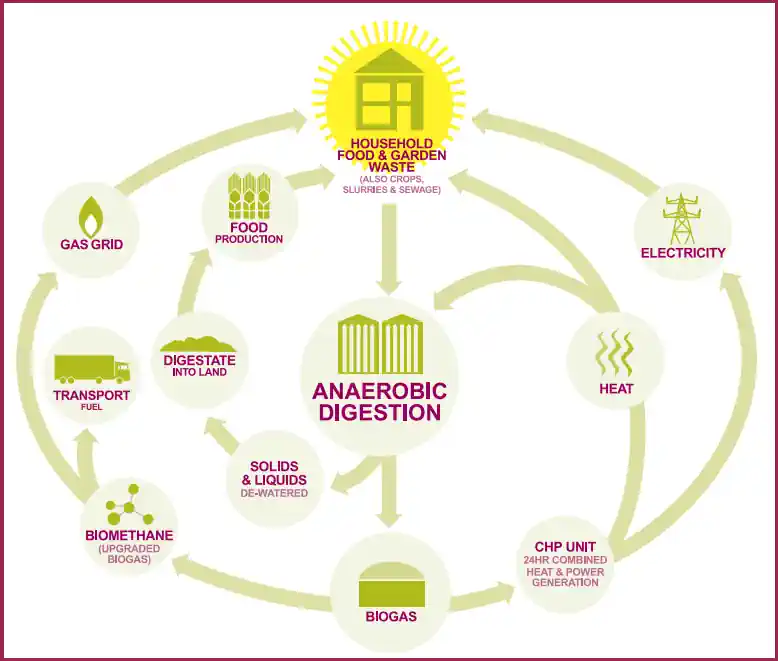Biogas methane (or biomethane) is rapidly emerging as a crucial player in the quest for sustainable energy solutions. With the potential to significantly reduce greenhouse gas emissions and enhance energy security, understanding its implications is vital for both individuals and industry leaders alike.
What You Will Learn
- Definition and Importance: Biogas methane is a renewable energy source generated from organic matter breakdown, offering a sustainable alternative to fossil fuels.
- Environmental Benefits: Utilizing biogas significantly reduces greenhouse gas emissions compared to natural gas, thereby aiding in the fight against climate change.
- Sources of Biogas: Biogas can be produced from various organic materials, including agricultural waste, food scraps, and landfill decomposition, showcasing its versatility.
- Anaerobic Digestion Insights: This efficient process involves microorganisms breaking down organic material in the absence of oxygen, which is essential for producing methane-rich biogas.
- Practical Applications: Biogas is used for heating, electricity generation, and as a vehicle fuel, highlighting its multifaceted role in energy systems.
- Economic Viability: Biogas production can be cost-competitive with natural gas under certain conditions, presenting financial opportunities in renewable energy investment.
- Community Engagement Strategies: Local awareness and involvement are crucial for promoting biogas, through workshops, partnerships, and social media outreach.
Understanding Biogas Methane: A Sustainable Energy Source
Defining Biogas Methane and Its Importance
What Is Biogas Methane?
Biogas methane is a renewable energy source created through the breakdown of organic matter. This process occurs naturally in environments with little to no oxygen, such as landfills and inside digesters. The main component of biogas is methane, which can be captured and used for various applications.
Differentiating Biogas Methane from Natural Gas
While both biogas and natural gas primarily consist of methane, they have different origins. Biogas is produced from organic materials, whereas natural gas is extracted from fossil fuel deposits. This key distinction makes biogas a more sustainable option, contributing to environmental preservation.
The Environmental Impact of Biogas Methane
Greenhouse Gas Emissions: A Comparison with Natural Gas
When considering greenhouse gas emissions, biogas has a significant advantage over conventional natural gas. Utilizing biogas can lead to a reduction in harmful emissions, helping to combat climate change. This is primarily because biogas production captures methane that would otherwise escape into the atmosphere.
The Role of Biogas in Reducing Carbon Footprint
Using biogas can effectively lower your carbon footprint in several ways:
- It reduces reliance on fossil fuels.
- It mitigates methane emissions from landfills.
- It promotes the use of waste materials for energy production.
Incorporating biogas into energy systems contributes to a cleaner environment and a sustainable future.
Sources of Biogas Methane
Natural Processes Generating Biogas
Biogas can be produced from various natural processes, including:
- Decomposition of organic matter in wetlands.
- Digestion of animal waste in farms.
- Breakdown of food waste in landfills.
These processes naturally occur and can be harnessed to produce valuable energy.
Biogas Production from Agricultural Practices
Agriculture plays a significant role in biogas production through the following methods:
- Use of manure from livestock.
- Processing of crop residues.
- Utilizing feedstock from food production.
These practices not only provide energy but also manage waste effectively.

Landfill Contributions to Methane Emissions
Landfills are notable sources of methane emissions due to the anaerobic decomposition of organic waste. Managing these emissions is crucial, and capturing methane from landfills can significantly reduce its environmental impact. By utilizing landfill gas, we can turn a waste problem into a sustainable energy solution.
The Anaerobic Digestion Process Explained
How Anaerobic Digestion Converts Biomass to Biogas
Anaerobic digestion is a crucial process in converting biomass into biogas. During this process, microorganisms break down organic material in the absence of oxygen, resulting in methane-rich biogas. This method is efficient and environmentally friendly, making it a popular choice for biogas production.
Understanding the Role of Methanogens in Biogas Production
Methanogens are specialized microbes that play a vital role in biogas production. They convert the byproducts of anaerobic digestion into methane, making them essential for biogas systems. By optimizing conditions for these organisms, we can enhance the efficiency of biogas production.
Applications of Biogas Methane
Uses of Biogas in Everyday Life
Biogas has various practical applications, including:
- Heating for homes and businesses.
- Electricity generation.
- Fuel for vehicles.
These uses demonstrate the versatility of biogas as an energy source.
Biogas as a Renewable Energy Resource
As a renewable energy resource, biogas offers several advantages, such as:
- Reducing dependence on fossil fuels.
- Contributing to energy security.
- Providing a sustainable solution for waste management.
Emphasizing biogas in energy strategies can foster more sustainable energy systems.
Economic Aspects of Biogas Methane Production
Cost Comparison: Biogas vs. Natural Gas
When evaluating the costs, biogas production can be competitive with natural gas under certain conditions. Factors such as feedstock availability, technology used, and local energy prices influence the overall economics of biogas. Investing in biogas technology can provide both financial and environmental benefits.
Investment Opportunities in Biogas Technology
The growing interest in renewable energy creates numerous investment opportunities in biogas technology, including:
- Developing advanced anaerobic digestion systems.
- Enhancing biogas purification methods.
- Exploring new applications for biogas utilization.
These opportunities can stimulate economic growth and promote sustainability.
Exploring the Future of Biogas Methane in Energy Sustainability
Advances in Biogas Technology
Innovations in Anaerobic Digestion Systems
Recent innovations are making anaerobic digestion more efficient and accessible. For instance, new designs allow for better mixing of materials, which speeds up the digestion process. Some systems even incorporate sensors to monitor conditions and optimize performance!
Emerging Trends in Biogas Utilization
As biogas technology evolves, several trends are becoming noticeable. Here are a few key trends to keep an eye on:
- Integration of biogas into existing energy grids.
- Use of biogas for transportation fuels.
- Development of local biogas production facilities.
Challenges and Solutions in Biogas Production
Addressing the Scrubbing and Purification of Biogas
One challenge in biogas production is the need to scrub and purify the gas. This process removes impurities, making the biogas suitable for various applications. Luckily, advancements in filtration technologies are making this easier and more cost-effective!
Regulatory Considerations for Biogas Producers
Regulations can impact the success of biogas projects. Here are some important regulatory aspects to consider:
- Permitting requirements for biogas plants.
- Standards for emissions and waste management.
- Incentives and subsidies available for biogas producers.
These are complex and require expert knowledge to navigate so many find it best to appoint an environmental consultant. These can be hard to find, but a good resource to find your best environmental consultant exists at the environmental consultant resource website.
Promoting Biogas Methane as a Viable Energy Alternative
Community Engagement and Awareness Strategies
Getting the community involved is essential for promoting biogas. Here are some effective strategies:
- Hosting workshops and informational sessions.
- Creating partnerships with local organizations.
- Utilizing social media to raise awareness.
Policy Changes Supporting Biogas Energy Adoption
Policy changes can significantly influence the adoption of biogas. Supporting policies might include:
- Tax incentives for biogas producers.
- Regulations favoring renewable energy sources.
- Funding for research and development in biogas technology.
Empowering a Sustainable Future with Biogas Methane
How Individuals and Businesses Can Contribute
Everyone can play a role in supporting biogas methane! Here are some simple actions:
- Participating in local cleanup and composting programs.
- Educating others about the benefits of biogas.
- Investing in renewable energy initiatives.
Final Thoughts on the Importance of Biogas Methane
Biogas methane has a vital role in creating a sustainable energy future. By embracing this renewable energy source, we can help reduce our reliance on fossil fuels and lower greenhouse gas emissions. Every small step we take today can lead to a greener tomorrow!



